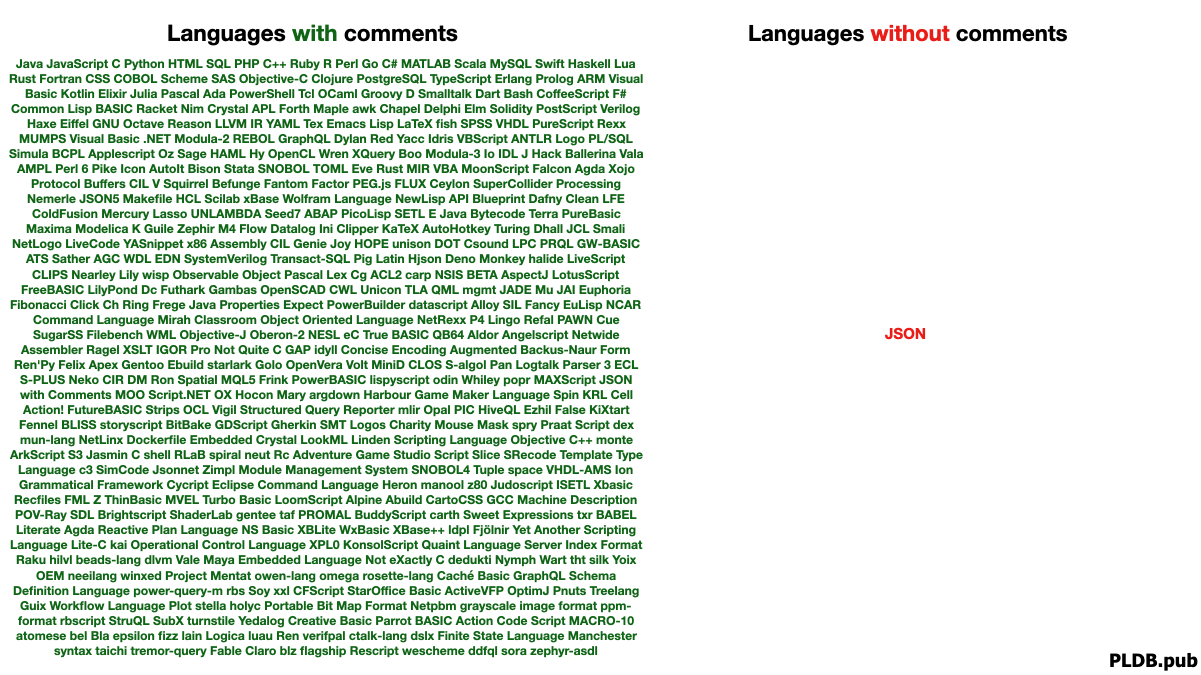Introduction
Mike Cowlishaw is a distinguished computer scientist and creator of Rexx and NetRexx. He has worked on many other programming languages, including PL/I, C and Java. Mike Cowlishaw is a Visiting Professor at the Department of Computer Science at the University of Warwick. He is a Fellow of the Royal Academy of Engineering, elected for his contributions to the field of engineering, and is a retired IBM Fellow. His relentless spirit has catapulted too many contributions to count yet he remains humble and accessible :)
Introduction
February 8, 2023 — Dr. John Ousterhout is a computer science luminary who has made significant contributions to the field of computer science, particularly in the areas of operating systems and file systems. He is the creator of the Tcl scripting language, and has also worked on several major software projects, including the Log-Structered file system and the Sprite operating system. John Ousterhout's creation of Tcl has had a lasting impact on the technology industry, transforming the way developers think about scripting and automation.
Data Entry Livestream: Adding appeared to four entities
February 8, 2023 — In this Livestream I show the sometimes boring and laborious process for adding data to PLDB.io.
The Livestream: Adding the rename keyword to TQL
February 4, 2023 — TQL is the new query language powering search on PLDB.io. In this livestream I show the process for designing and coding up the rename keyword.
Introduction
January 24, 2023 — Josef Pospíšil (Pepe) is a programming enthusiast, first with Basic in 1986, then the first Rubyist in the Czech Republic, and now a contributor to the language Janet.
2022 Recap
January 3, 2023 — 2022 was a breakout year for a Programming Language DataBase (PLDB). We are now used by over ten thousand people in a slow week and probably were used by over a million people on the year (I can't be too exact since our stuff is public domain and we don't do much tracking). Some of the world's top software people got in touch with us and we now provide analysis on how to make their companies' languages better. Not bad for a research effort started by a kid from Brockton without a PhD! I am 100% convinced that someone can (and will) revolutionize research in any and every domain simply by copying our tech and creating a high-quality public domain CSV file for their domain.

2022 was the year PLDB got the mythical product market fit.
Introduction
November 22, 2022 — Dr. Kartik Agaram is a professional programmer by day and the author of several open source projects that try to demystify computers. His projects all show a great love for programming and empathy for readers grappling with a strange codebase.
Interview
Hassam: What problem is Mu attempting to solve?
Continue reading...Introduction
November 18, 2022 — Niklaus Wirth has designed programming languages all over the world that have had immense impact. And yet, he still maintains great humility and somehow finds time for mentoring the next crop of programming language designers. Thank you for your time Dr. Wirth!
Interview
Hassam: Are there any novel ideas from your languages that have yet to be adopted by others?
Continue reading...Introduction
November 15, 2022 — Dr. Brian Kernighan is a Canadian computer scientist who contributed to the development of UNIX at Bell Labs. Along with Dennis Richie, he co-authored a fundamental book on C, The C Programming Language. He has been training the next generation of programmers at Princeton University since 2000 and has been monumental in his contribution to the computer science community at large. He wrote the first documented “Hello World!” program and to that we say, “Hello, Brian!”.
Interview
Hassam: Are there any novel ideas from Awk that have yet to be adopted by others?
Continue reading...Introduction
November 11, 2022 — Dr. Scott Fahlman is a Professor Emeritus in the Carnegie Mellon’s School of Computer Science. He is a computer programming language connoisseur and the original neural network jedi master. He was one of the core developers of the Common Lisp Language and his current work includes Artificial Intelligence. Dr Fahlman is as notably kind as he is a humble scientist. Befittingly, he is the originator of the internet's first emoticon, sideway smile :-)
Interview
Hassam: Are there any neat ideas from Lisp that have yet to go mainstream?
Continue reading...November 2022 Edition
November 3, 2022 —
The above SVG is also available as a png.
The code for the visualization above was written in the Explorer language.
You can export the data using this Ohayo script:
Previous posts in this series
September 2, 2022 —
The above SVG is also available as a png.
The code for the visualization above was written in the Explorer language.
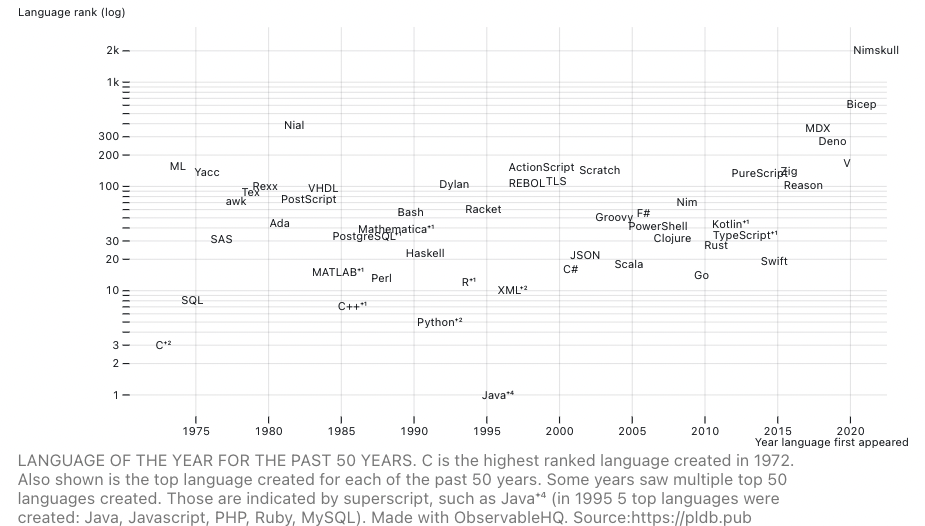
July 21, 2022 — 1995 was an exceptional year for programming languages: Java, Javascript, PHP and Ruby were all created in 1995. I was curious what the top language was for each of the past 50 years.
Continue reading...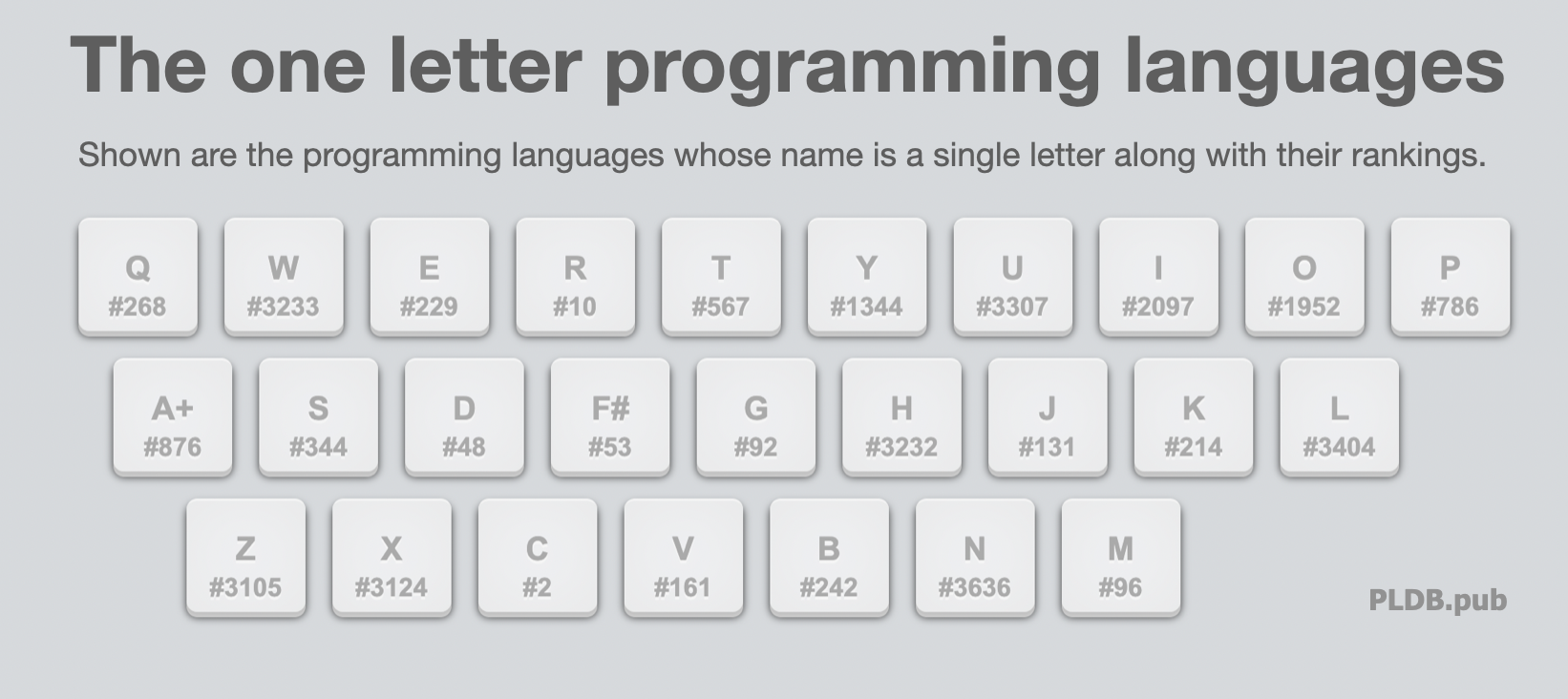
July 16, 2022 — C and R are two famous programming languages whose name is a single letter. In an effort to retire this practice (😉), I've made an infographic to show that all the letters are taken.
Continue reading...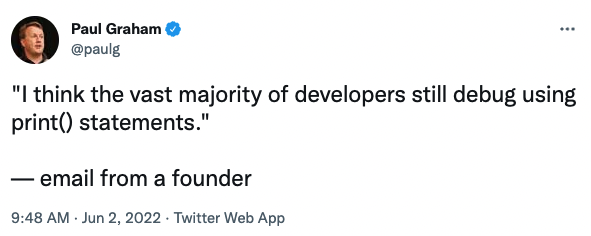
July 15, 2022 — Paul Graham—creator of Arc and Bel—started an interesting thread last month about "print() debugging".
Continue reading...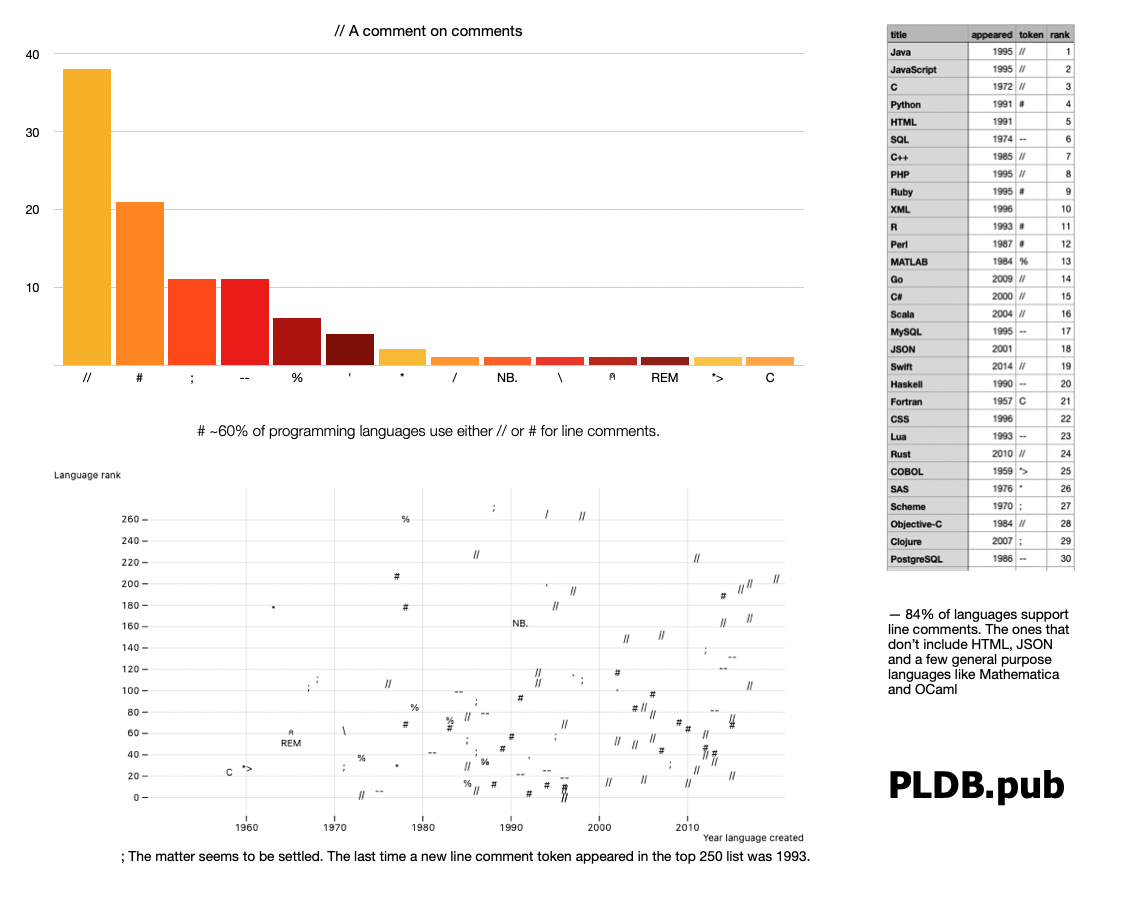
July 13, 2022 — About 85% of the languages in PLDB have line comments.
Continue reading...June 23, 2022 — I started PLDB 1,681 days ago(~4.5 years). After a big lull, I am excited to announce the new release!
- all source code for the site and database is now on GitHub.
- the database went from 3,800 to 4,266 entries.
- there are now pages listing the top 100 languages, top 250 languages, and languages by origin community.
- each language page now lists all fields.
- the site now runs on Scroll instead of Jekyll.
November 18, 2019 — I started PLDB 2 year ago today! Since that time:
- In the past year, PLDB has gone from less than 1,400 languages to over 3,800! Almost a 3x increase!
- In the past year, I added the programming language features page which now lists 90 features!
- I also added the file extensions page which lists over 1,300 file extensions!
- The programming language design conference page has 6 conferences listed for 2020.
September 7, 2019 — I have done many problems on Project Euler but I've never participated in competitive programming. The other day I got curious, what does the competitive programming landscape look like?
I started my quest by watching a great interview with a competitive programmer. Then I did some searching. Below are my results.
There are 16 major programming competitions
The first one started in 1970. A few of the newer ones are online only.
Most of them started or are hosted in the USA
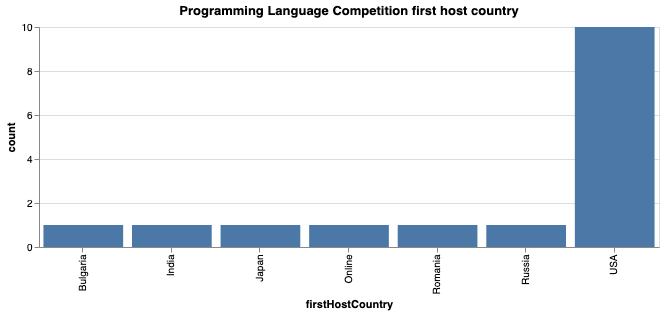
May 29, 2019 — There are around 7.574 billion people in the world. How many of them are programmers?
The answer, of course, depends on how you define "programmer". But before I define "programmer" and share my estimates, let's look at what some other sources say.
What do other people say?
GitHub - 36 million developer accounts
February 7, 2019 — Like millions of other programmers, every day I depend on central package repositories (CR) like npm, PyPI and CRAN.
The other day I was curious: does every programming language have one of these? I decided to find out. I pointed my crawler and trained a model to check for a package repository for every one of the 3,006 languages I am tracking. The results surprised me.
★ Only 1% have them
January 24, 2019 — Python, as one of the top 10 programming languages in the world, is the most popular programming language that treats indentation as significant. In these offside languages, programmers indent their code blocks instead of using braces, brackets, or other visible characters.
I was curious about how common these languages were so I did some brief analysis to answer these questions:
- 1. How common is this type of language?
- 2. How many languages use significant indentation?
- 3. Are new indentation languages on the rise?
1) Fewer than 2% of programming languages have significant indentation
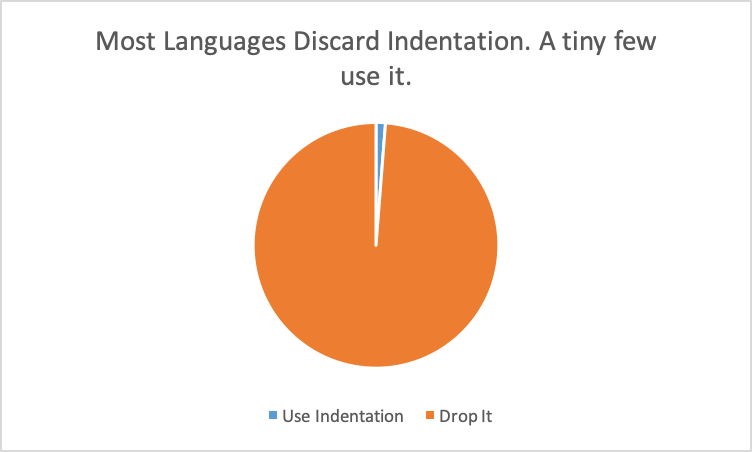
November 18, 2018 — I started PLDB 1 year ago today! Since that time:
- PLDB has gone from less than 400 languages to over 1,300! A 3x+ increase!
- PLDB has gone from less than 1GB to over 140GB of raw data! A 100x+ increase!
- PLDB has gone from tracking a few dozen dimensions to over 1,350! A 30x+ increase!
Unfortunately the number of articles on PLDB is 9 (counting this one). Limited time and resources has meant building up the dataset took priority. Hopefully the next year will see a lot of growth in number of posts!
November 9, 2018 — Before GitHub started in 2008, the source code for nascent programming languages was stored in a variety of places. In the early days it was physical media; later on it was publicly accessible servers; and even later it started moving to online source control systems like self-hosted SVN servers or Sourceforce.
But nowadays new language creation happens on GitHub more than anywhere else. Of the 44 languages created in 2008 that I track, 7% were put on GitHub that same year. Last year it was over 50%.
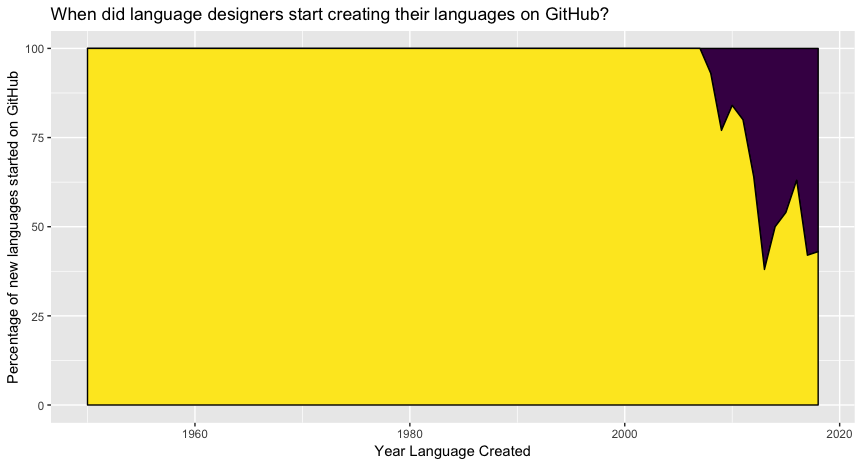
October 28, 2018 — As the chart below shows, the number of programming languages beginning with a certain letter varies as much as 10x by letter.
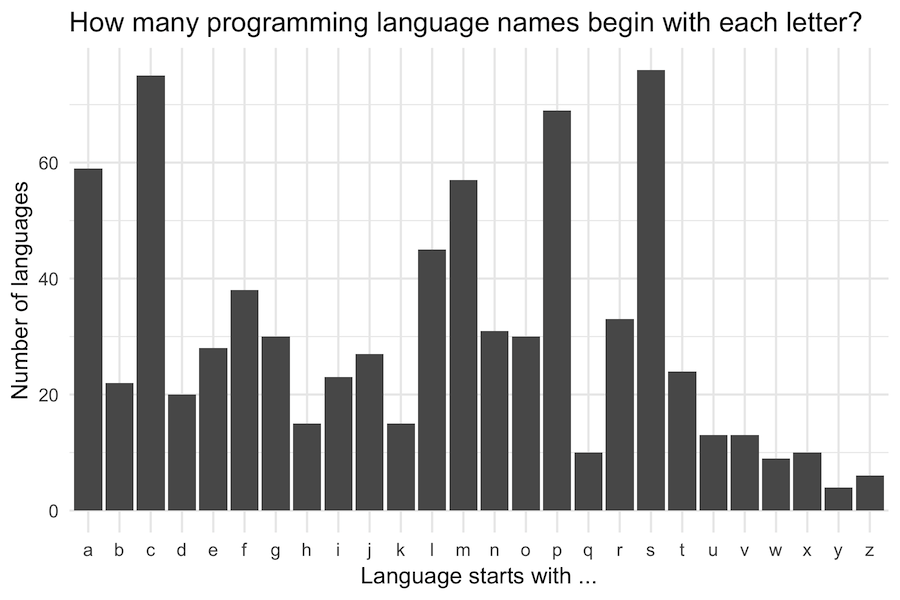
December 12, 2017 — As I build up my database of programming languages I hope to be able to answer questions like:
- is the rate of new language creation accelerating, slowing down, or constant?
- what spurs the creation of new programming languages?
- can we predict how many new languages will be released next year? in 5 years? in 10 years?
At the moment I am tracking 533 computer languages and I currently have creation years for more than half of those, including for 271 of the most popular ones.
Here is a simple line graph of the cumulative number of languages I have by year.
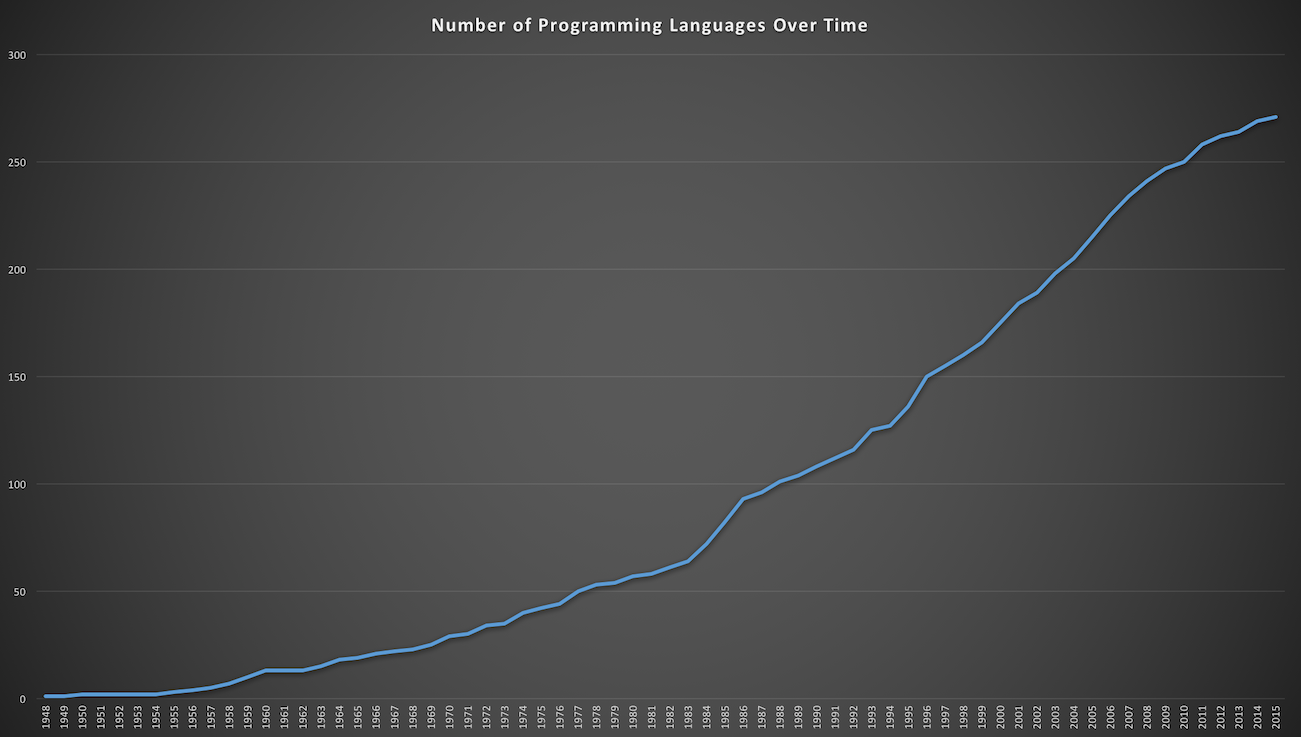
December 11, 2017 — I was looking to spruce up the walls with some interesting posters and found a few well designed visuals.
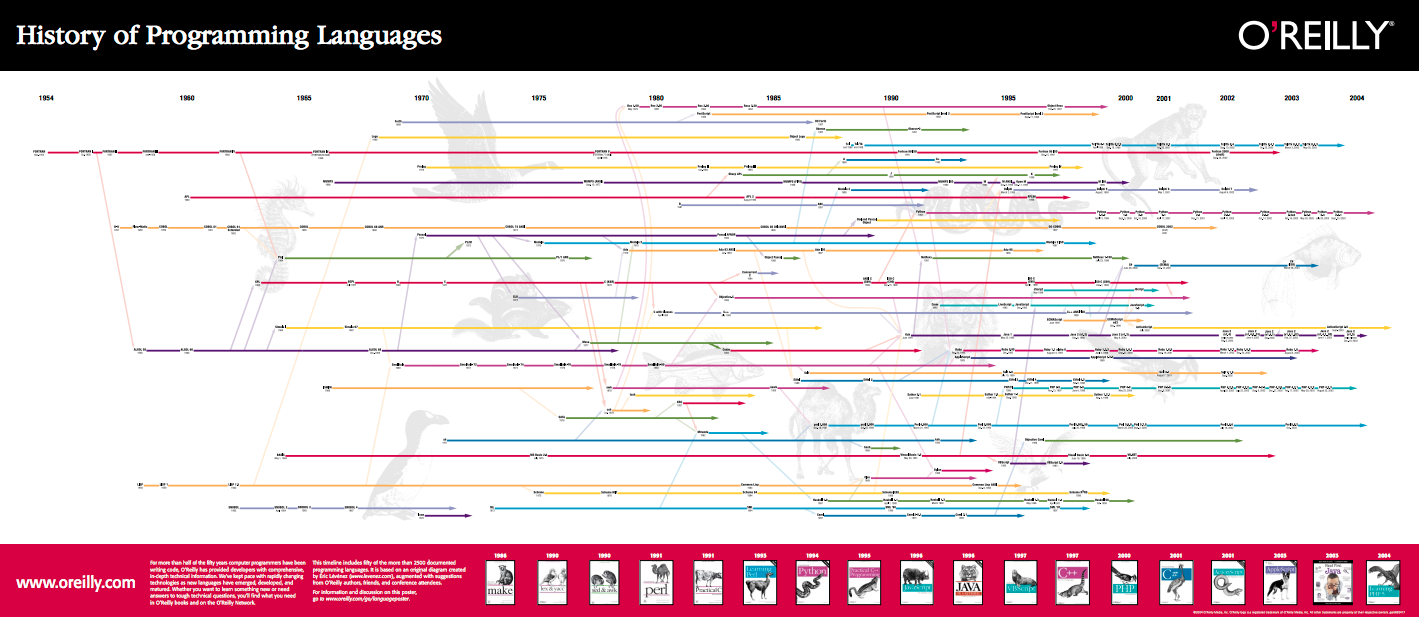
November 25, 2017 — Last week I explored the question "how many programming languages are there in the world?". My current estimate is between 5,000 and 25,000 active computer languages.
But perhaps the number is higher, if you include all active external web APIs.
Continue reading...November 20, 2017 — ~7,099 spoken languages exist. But how many programming languages exist?
This is one of the questions I aim to answer with PLDB. I am building a comprehensive database of programming languages.
Spoken languages vary widely in popularity. For example. English has 1.5 billion total speakers and 375 million native speakers. Hawaiian, an endangered language, has only ~26,000 native speakers.
Similarly, some programming languages are very popular, others are used moderately, and many are completely abandoned. Javascript may be the most popular programming language, with approximately ~5.3 million LinkedIn users claiming it as a skill.
The number of programming languages in the world depends on the rules you establish for deciding whether or not a language counts.
What do other people say?
November 18, 2017 — Welcome to PLDB: a Programming Language Database!
The goal of this site is to build a comprehensive database of programming languages and their common features.
This site is for two types of people:
- The general programmer. I want to analyze my data to make comprehensible the world of programming languages for you and provide sound strategic and tactical advice to help you in your projects and your career. If you have a question not answered by this site, open an issue and explain what you need.
- The programming language designer. I want to build a research tool for you so you have quick access to comprehensive data on features in programming languages, to help you make design decisions as you design your own languages. If you need more information on a design pattern not on this site, open an issue and explain what you need.
